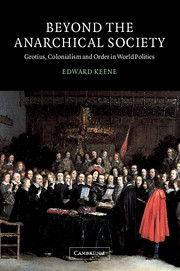Book contents
- Frontmatter
- Contents
- Preface
- Acknowledgements
- Introduction
- 1 The orthodox theory of order in world politics
- 2 The Grotian theory of the law of nations
- 3 Colonialism, imperialism and extra-European international politics
- 4 Two patterns of order in modern world politics: toleration and civilization
- 5 Order in contemporary world politics, global but divided
- Conclusion
- Bibliography
- Index
5 - Order in contemporary world politics, global but divided
Published online by Cambridge University Press: 22 September 2009
- Frontmatter
- Contents
- Preface
- Acknowledgements
- Introduction
- 1 The orthodox theory of order in world politics
- 2 The Grotian theory of the law of nations
- 3 Colonialism, imperialism and extra-European international politics
- 4 Two patterns of order in modern world politics: toleration and civilization
- 5 Order in contemporary world politics, global but divided
- Conclusion
- Bibliography
- Index
Summary
By the late nineteenth century, international lawyers and diplomats considered it perfectly reasonable that there should be one kind of political and legal order for the ‘family of civilized nations’ and another for the uncivilized world beyond. No such distinction is made by diplomats and lawyers today, at least not in public; it is generally assumed that a single, global pattern of political and legal order exists, which should be indiscriminately applied to all peoples. Of course, that is not to say that there are no controversies about the fundamental principles on which this global order is based, or about how it operates in practice. There is a profound tension, for example, between state sovereignty and human rights, since the assertion of individuals' rights in international law and the protection of those rights by international organizations can be seen as compromising the principle that each state possesses an inviolable domestic jurisdiction by virtue of its sovereignty. That, moreover, is but one of several ways in which the sovereign independence of states is perceived to be threatened by the increasingly centralized, even supranational, authority of international organizations at both the global and regional levels. In this chapter, I want to explain how this global order was constructed, and why it suffers from such serious dilemmas about the relationship between state sovereignty and other aspects of the political and legal structure of international relations today.
- Type
- Chapter
- Information
- Beyond the Anarchical SocietyGrotius, Colonialism and Order in World Politics, pp. 120 - 144Publisher: Cambridge University PressPrint publication year: 2002

